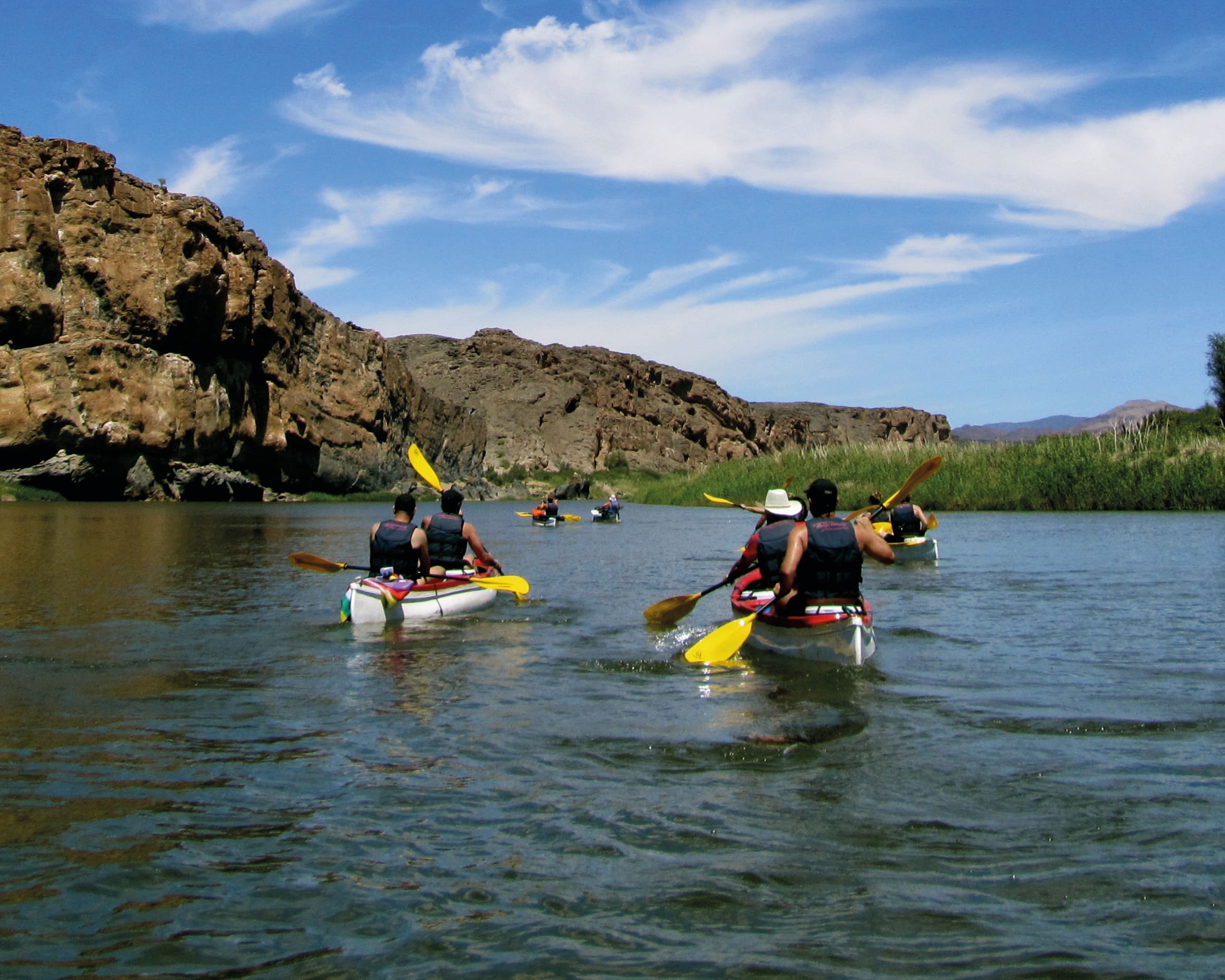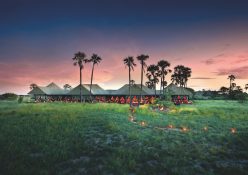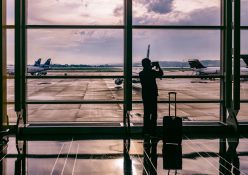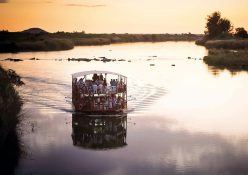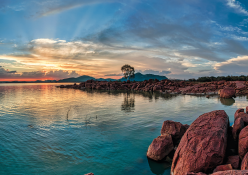With some of the most dangerous rapids in the world, The Orange River is the ultimate white-water adventure. It’s an unbelievable experience that should occupy the top of your bucket list

The San call it eGariep, and to the Voortrekkers it was the Grootrivier. But when South Africa’s longest river received its modern appellation in 1777, the Cape was Dutch so it was christened in honour of Prince William – who was of the House of Orange. Whatever its royal connections, the Orange River is a lifeline for many, and a source of immense thrills for those lucky enough to try taming it with a paddle and a canoe. We were an entourage of wannabe adventurers (led by limber river guides bursting with energy and charm) and had signed up for a cocktail of camping, unforgettable scenery and mild physical exertion. A canoe trip that would take us through a vast and bewitching arid wilderness. The Richtersveld mountain desert is one of southern Africa’s harshest terrains – a dry, brittle region of stark, rock-strewn embankments and ancient volcanic debris. The landscape is intoxicating, sufficiently dramatic and quite mystical to evoke a sense of other-worldliness. This could be the far side of the moon, or perhaps some wondrous corner of Mars.
Visually surreal, the barren, forbidding terrain lends itself to adventure. Carving its way through it, the final stretch of the Orange provides the substrate for a spellbinding journey. Getting there required a bit of a trek. Some 760 kilometres from Cape Town, we arrived at Felix Unite’s Provenance Camp, just beyond the Namibian border, having driven through a fair share of Northern Cape backwater towns, many of them worth stopping in for a while. The Richtersveld morning sun was impatient, so we got an early start. After much dabbing of sunscreen and filling of cooler boxes we met up with our crew, learned how the oars worked, and got a detailed safety briefing. There was to be nothing particularly furious or challenging in terms of the rapid difficulty, we were told.
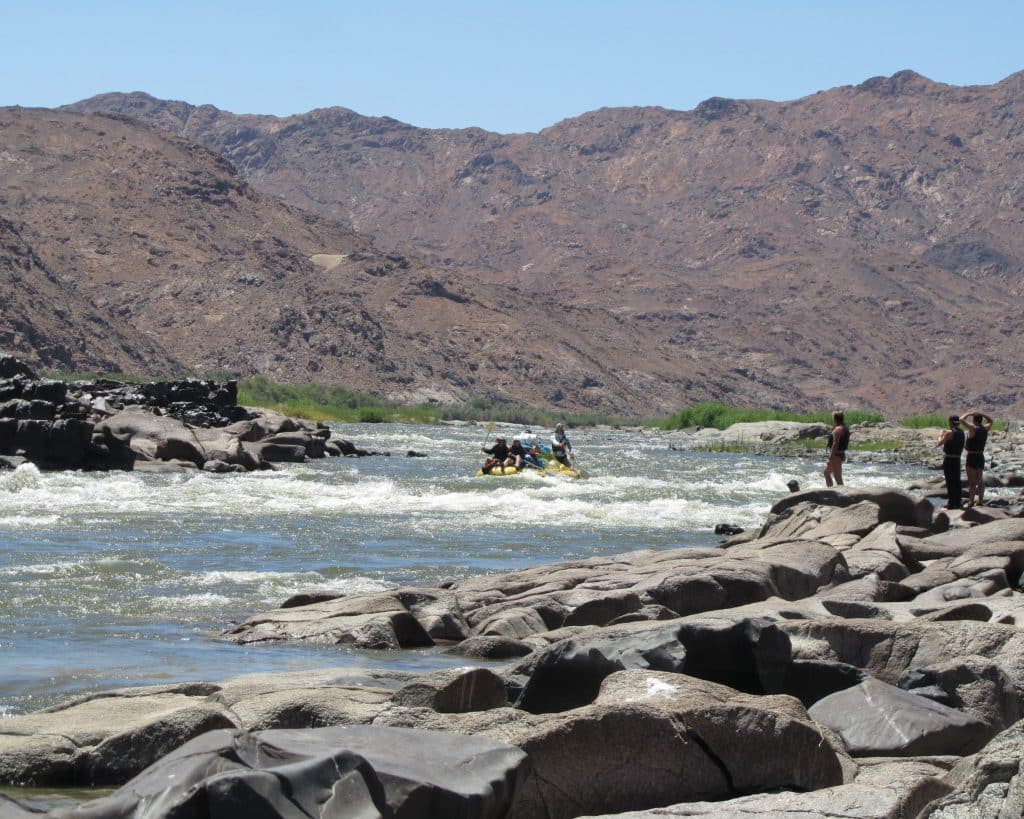
The most we were to encounter were grade 2 or 3, but hearing a few of the more ominous names – Stairway to Heaven, Rocky Horror, and Dead Man’s Rapid – managed to elicit a few nervous giggles. ‘But where are the brakes on this canoe?’ asked one of the canoe virgins from Johannesburg. A chorus of laughter came about, and then we were informed about the obvious advantage involved in the motion of paddling backwards in order to slow down a canoe. And with that, we were ready for our water-bound rodeo. For much of the trip we’re gliding silently over idle-flowing water, the only sounds those of our paddles breaking the surface or someone occasionally cracking open a beer.
Flat out and furious
Top speed on the flat water is around 5 km/h per hour, although slow water meant more shoulder-powered engine work in order to move forward. But the lazy stretches also gave us a chance to occasionally jumping ship to cool down, or stop at a beach or island for a break. It also gave us a chance to simply absorb the all-out awesomeness of the craggy, upward thrusting peaks and mottled mounds – baked orange-ochre in the harsh sun – that enfolded us. Occasionally, there would be a foul-up. An unexpected rock caught someone unaware; they’d get stuck, helpless, and then inevitably become victims of T-boning – being slammed side-on by another canoe. At times we went at it as if riding dodgems, the wilderness bringing out the child in each of us. There was lots to look at, too.
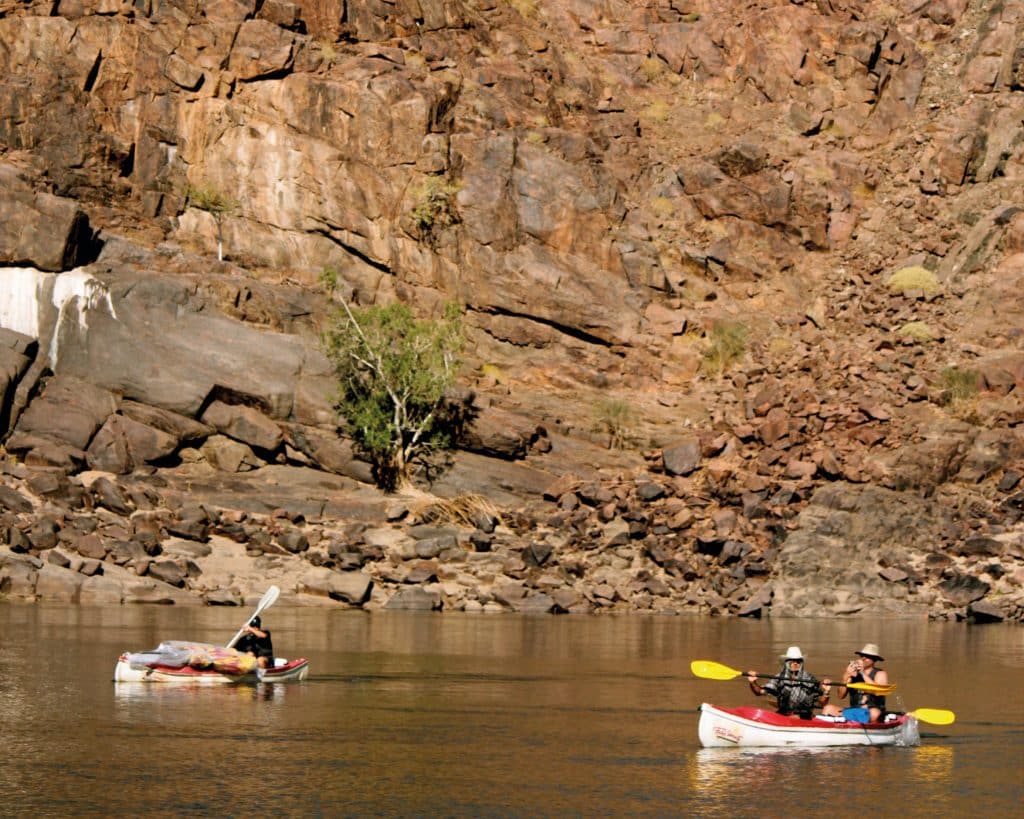
Amidst all the empty desolation of the Richtersveld, there were gnarled quiver trees, tall aloes and the enchantingly-named half-mens, which the Nama revere as the embodiment of their mythical half-human, half-plant ancestors. Away from the river, it’s a wonder anything survives. What little water there is comes largely in the form of an early-morning fog – known as ‘malmokkies’ – which rolls in from the ocean. Thanks to this airborne moisture, there are all kinds of unimaginable succulents and fat-leaf plants that have adapted to the dry, searing conditions. Cold winters mean that the Orange is free of crocodiles, too, but there is abundant birdlife – fish eagles, African darters, white-breasted cormorants and impossibly-large Goliath herons always launching their mammoth frames into the mysterious air. We were never idle for too long. On hearing the distant thunder of fast-moving water, we’d ready ourselves for action.
This involved a bit of furious super-paddling, more studious navigation and wide-eyed rock-watching. When we hit the rapids, they were trickier that we’d imagined. And, of course, most of the important details and nifty information that was shared during our introductory paddling lesson had disappeared from memory. As we tackled the legendarily venomous Sjambok rapid, no doubt named for the whiplash-effect of the sudden turn as you enter the fast water channel, the Orange capsized most of the canoes, slam-dunking at least a dozen of us.
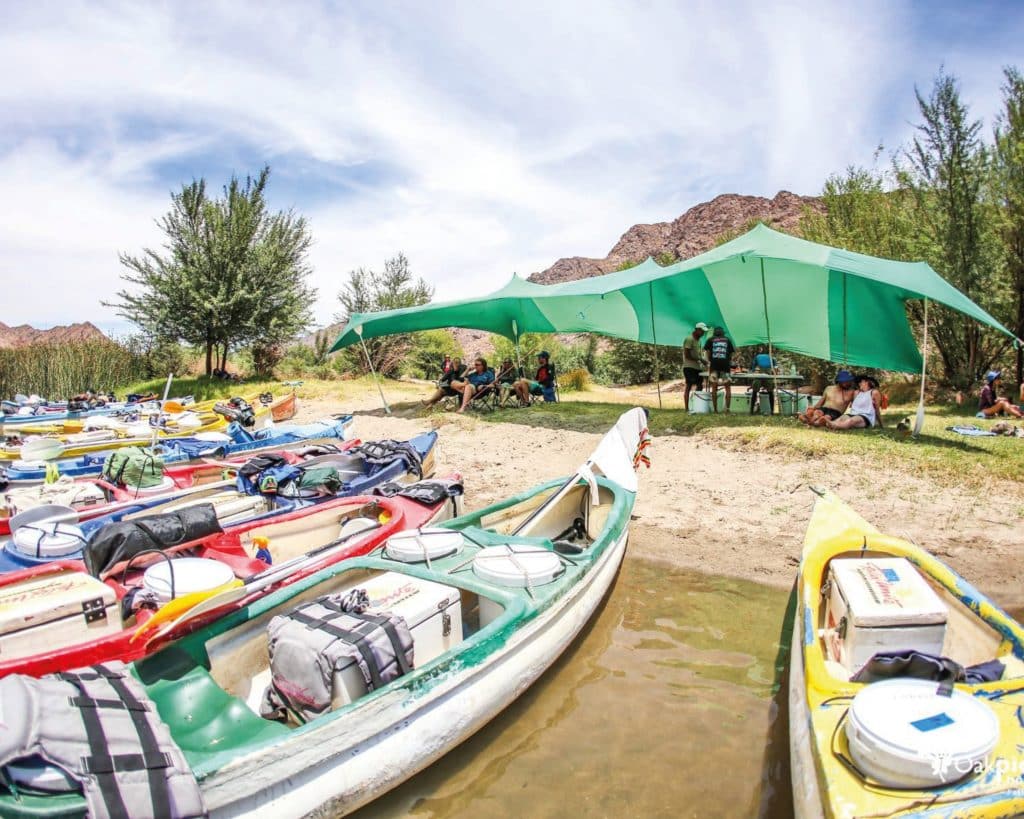
Magic on the river
Tumbling into the water was more godsend than punishment out there in the barren nothingness. As we took time out to repair injured canoes and fractured egos, our guides demonstrated how to use the all too familiar ‘cocktail position’ as a carefree way of floating down the river, our lifejackets transformed into buoyant nappies. Each night we camped on a different patch of beach along the river, either sleeping in tents or – more often than not – under the stars in the warm night air, listening to the distant cry of an occasional jackal. With temperatures sweltering, afternoons were generally spent sprawled beneath umbrellas as we waited for our lunch to digest.
Some 68 kilometres of paddling brought us, over three-and-a-half days, to our final take-out point at Aussenkehr. It is here that the climate and river sustain one of the largest table grape farms on Earth – the emerald vineyards are a shocking contrast to the plain ochre of the hot desert surroundings. Back at Provenance, no longer Orange River virgins, we steadily acclimatised to the burdens of daily life. Reunited with our phone gizmos, Internet contacts, the soft hum of electric circuits, and the realisation that the carefree fantasy cannot last forever, we spend a final afternoon lolling by the pool, inventing tall tales over cocktails, beers and shooters at the bar. The river had worked its magic.
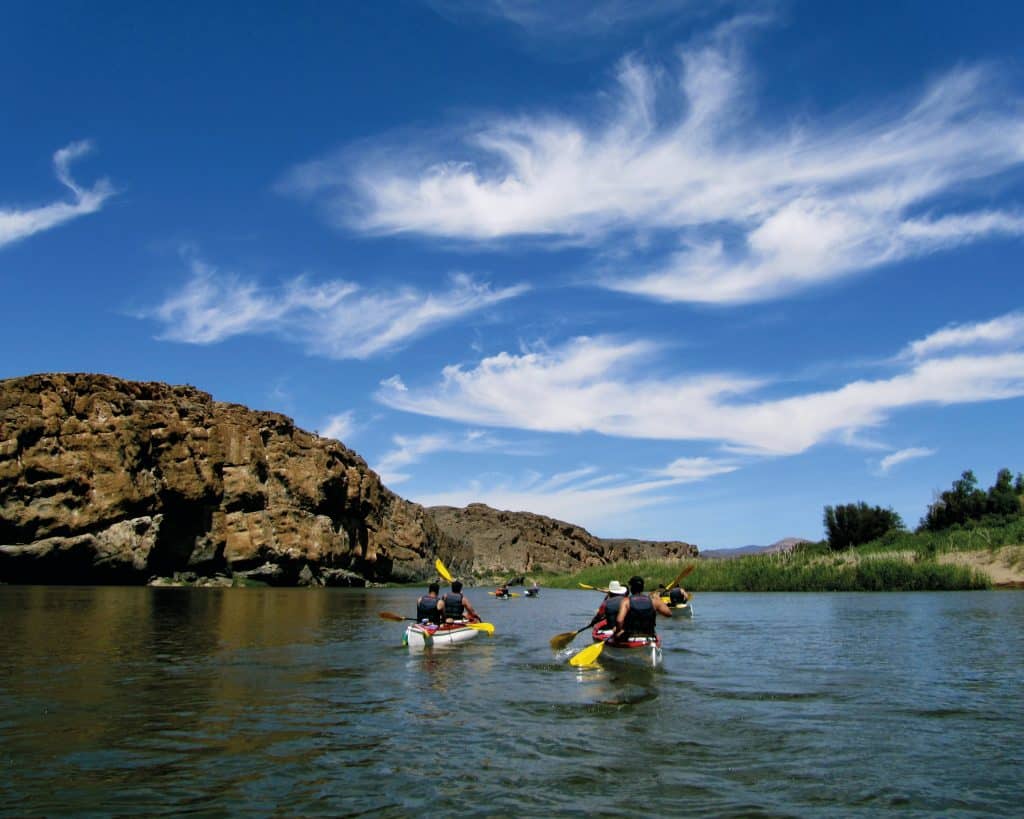
Words by Keith Bain
Photography: Courtesy Images



